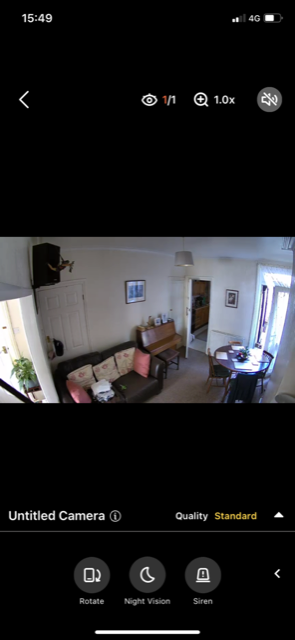Many people consider moving after experiencing a burglary.
While moving house might help victims to move on and experience a sense of normalcy again, burglary is common in most places.
In this article, we’ll explain the pros and cons of moving after a burglary and how to feel safe again after a burglary.
Should You Move After Being Robbed?
It’s expected that many victims desire to move after being robbed because of a sense of violation and vulnerability.
Moving to a new home might be beneficial if the burglary was particularly traumatizing, and if the neighborhood itself is especially dangerous.
But moving house won’t prevent a second break-in. Studies show that most home moves take 6 months on average in the US, while most burglars come back to the same house just one month after the first break-in.
With a burglary happening every 30 seconds in the US, break-ins are actually a common experience for Americans.
Do Burglars Go Back to the Same House?
Repeat burglaries are common. A quarter of homes are broken into again just one week after the first break-in. Over half are broken into again within the first month.
Even if the intruder didn’t steal anything on the first break-in, they are likely to return to the same house to carry out a theft.
Learn more about repeat burglaries and how to prevent a second break-in.
How Do You Move On After a Burglary?
Being a victim of a burglary is a harrowing experience. Many people feel helpless after a burglary, but the anxieties you feel in the immediate aftermath will ease over time.
Let’s address some of the ways to begin to move on after a burglary.
1. Know the facts
Learning the facts about burglaries can ease anxieties about what may happen in the future, and create clarity and peace of mind over what happened.
The most important facts to remember after being burgled:
- After a burglary, over 50% of properties are targeted again within one month.
- Most burglaries are committed by people in the surrounding area.
- 50% of burglaries are committed by someone you know.
- Up to 60% of burglars won’t target a property with home security cameras.
2. Complete repairs quickly
If a burglar returns to a property it’s probably because they know it’s vulnerable.
They may have tampered with the locks, left windows open, or stolen keys to make it easier to break in again. That’s why it’s important to complete repairs as quickly as possible.
After a burglary, make sure to:
- Change the locks
- Check all locks to ensure they haven’t been tampered with
- Repair any broken locks
- Repair window breakages
- Keep windows closed and locked (including in garages)
Because burglars have already been inside the home, they know the layout and where the valuables are. Temporarily moving things can confuse burglars should they manage to break in again.
3. Install home security cameras
Over 50 million US homeowners have security cameras installed on their properties to protect themselves from break-ins.
Studies show that 60% of burglars will walk away from a property if they spot a security camera. Homes without cameras are a prime target for burglaries and home invasion.
Install instant home security cameras with AlfredCamera
Because most properties get burgled again just weeks after the first break-in, homeowners must secure the property as quickly as possible.
Choosing and installing home security cameras takes time, particularly if the cameras are hardwired vs wireless.
AlfredCamera is the fastest solution to protect a property. It transforms your spare phones into free security cameras. Simply download the AlfredCamera app to your phone as well as an old phone or tablet, and position the device where you need it (ideally in a hallway, garage, or over vulnerable entry points).
Alfred provides motion detection, two-way audio, and push notifications in real time to better protect your space.

4. Secure the property
The more secure a property is, the less likely it is to be broken into again.
Key ways to secure a property after a break-in and ease future anxieties are to:
- Install preventative signage (like CCTV in Operation or Guard Dog on Patrol)
- Add additional locks to weak points (like garages, sheds, interior garage doors with access to the property, basement wells, side gates, and doors)
- Secure the garage
- Keep ladders locked in a yard shed
- Lock windows when not in use
- Add extra security to back doors
- Trim overgrown shrubbery that provides criminals with places to hide
Signs your house is a burglary target (and what to do about it)
When a break-in is premeditated, there’s often signs left that indicate a house is a target.
Some of the most common signs burglars leave include:
· Stickers on mailboxes
· Paint left on fences
· Rope tied around lamp posts
· Broken outdoor lights
Learn more about signs your house is a target and what to do about it.
5. Get back into normal routines
It’s tempting to stay home all the time or even live away from the property after a burglary. However, this will only delay the healing process.
Leaving a property empty also makes it more vulnerable to burglary, especially if it’s already been targeted before.
Once the property has been secured, try to get back into normal routines as quickly as possible. Returning to your daily routines can help you forget about the experience and prevent anxieties from progressing.
Normal routines with a twist
With AlfredCamera, you can get back to life as you knew it before the burglary.
Live feeds are easily accessed by multiple users thanks to Trust Circle, a unique feature that safely shares your AlfredCamera devices with family or friends. Having more eyes on the property after a burglary provides a massive sense of relief as you readjust to ordinary life.
Premium users also make the most of Person Detection, an AI powered motion detection tool that triggers devices only when humans are detected. You’ll get notified immediately, meaning you can activate the loud built in siren and call the police, should trespassers return.
Download AlfredCamera now, or learn more about how to deepen your home security with Alfred Premium.


6. Process the experience
Moving on from a burglary means processing it in order to heal.
Many people experience PTSD (post-traumatic stress disorder) after being burgled, which is diagnosed by a licensed mental health professional.
This isn’t an abnormal response to being burgled, and it’s important to deal with the trauma properly. Counseling and advice from mental health professionals aids in processing trauma and regaining confidence.
If you’re struggling after experiencing a burglary, you are far from alone. Help is available.
Find help now with the Directory of Crime Victim Services. If you have mental health concerns, always speak to a licensed mental health practitioner or your doctor.
Conclusion
Moving house after a burglary is rarely an option for most people, but that doesn’t mean your home has to be a place of uncertainty and fear.
Installing cameras and repairing the property should always be the first step to feel safer at home.
While moving away from a particularly dangerous neighborhood might offer peace of mind, it’s also important to process the trauma effectively. If you are struggling after experiencing a burglary, counseling and other mental health services are an invaluable means of recovery.
Recommended reading:
Burglary vs Robbery: What’s the Difference?
When Do Most Burglaries Occur?
What are the Most Common Entry Points For Burglars?
How Does Burglary Affect the Victim?
How to Stop Worrying About Being Robbed or Burgled in 8 Steps
Deterring Burglars: Is It Safe To Leave Lights On For A Week?
